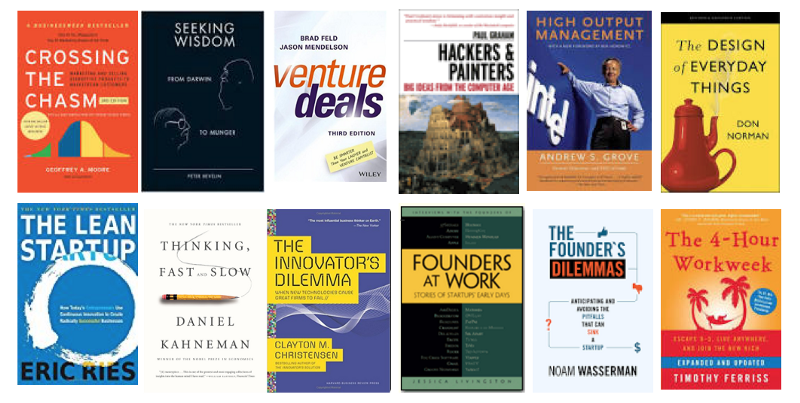Startup Books Every New Founder Should Read
If you’re a first time or student founder, or simply looking to learn more about starting a company, here’s a curated list of best startup books to read to get you up to speed.

- The Lean Startup, Eric Ries.
Based on his experiences as a founder, employee, and advisor, Eric proposes the lean startup strategy, a methodology used by top startups today which suggests shorter product development cycles through hypothesis-driven experimentation aimed at meeting the needs of early customers. This methodology forged a path for the lean startup movement, with annual conferences and meet-ups throughout the world.
- The Innovator’s Dilemma, Clayton Christensen
HBS professor and businessman Clay Christensen outlines the dilemma that many companies face even when they seemingly do everything “right.” Christensen first coined the term “disruptive innovation,” outlining an S-Curve to describe the many iterations a product will make to provide value to customers.
- Thinking, Fast and Slow, Daniel Kahneman
Acclaimed psychologist Daniel Kahneman details his research on the two types of thought: those that involve instinct and emotion, and those involving slower, more deliberate logic. Kahneman shares examples of common biases in decision making based on basic principles of human behavior.
- Venture Deals: Be Smarter Than Your Lawyer and Venture Capitalist, Brad Feld and Jason Mendelson
This book is an insiders guide to venture financing, covering topics such as fundraising, negotiation, and understanding the VC model. Authors Brad Feld and Jason Mendelson, Managing Directors of Foundry Group demystify legal jargon and common misunderstandings associated with term sheets, cap tables, and letters of intent. A must read for any founder fundraising for the first time!
- Hackers & Painters: Big Ideas from the Computer Age, Paul Graham
Through a series of essays, co-founder of Viaweb and venture capitalist Paul Graham examines commonly held assumptions about programmers and hackers, helping to showcase characteristics and tell important stories around the renaissance if the programming language, or the Open Source Movement, drawing parallels between two art forms: hacking, and painting.
- Founders at Work, Jessica Livingston
Jessica Livingston, founding partner at Y Combinator shares a collection of interviews from early stage startups that she has worked with throughout her career. Livingston covers topics including the importance of a founding team, or managing early funding from entrepreneurs such as Steve Wozniak (Apple), Caterina Fake (Flickr), Mitch Kapor (Lotus), Max Levchin (PayPal), and Sabeer Bhatia (Hotmail).
- The Design of Everyday Things, by Donald A. Norman
Donald A. Norman, cognitive scientist and usability engineer, and former Director of the Institute for Cognitive Science at the University of California asserts that the communication between an object and a user is optimized by design. Through use cases, Norman explores what makes good and bad design, while proposing design principles such as user-centered design.
- High Output Management, Andrew Grove
Former CEO of Intel, Andrew Grove provides a guide to the art and science of management, covering topics such as creating managerial leverage, running effective meetings, or motivating employees. The book serves as a practical guide for new founders exploring management techniques for the first time.
- The Founders Dilemma, Noam Wasserman
Academic and HBS professor Noam Wasserman draws upon his research to explore common early decisions made by founders and how to avoid pitfalls associated with them. Drawing on anecdotes from Evan Williams of Twitter and Tim Westergren of Pandora, Wasserman explores topics including splitting equity with friends or family, or being an adaptable leader.
- Crossing the Chasm, Geoffrey A. Moore
Moore details a startup’s journey in the Technology Adoption Life Cycle, explaining why a chasm between the early adopters and the early majority, and how to narrow this chasm in pursuit of accelerating business adoption.
- Four Hour Work Week, Tim Ferriss
Writer, educational activist, and entrepreneur, Tim Ferriss provides a blueprint for streamlining specific business actions and eliminating distractions, with the idea that 80% of your productivity comes from 20% of your time.


